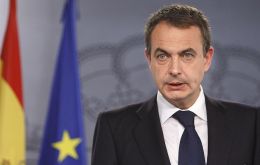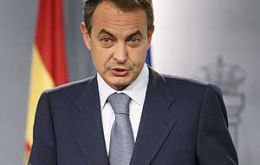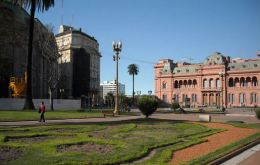MercoPress. South Atlantic News Agency
Economy
-
Friday, June 18th 2010 - 00:37 UTC
Salmon farming in Chile greater environmental threat than estimated

Salmon farms in Chile are a worse threat to the environment than originally thought following on unexpected results from a German scientific research team studying communications among whales in the southern Pacific along Chilean Patagonia.
-
Friday, June 18th 2010 - 00:08 UTC
Spain’s leading bank “one of the best” in the EU, says Rodriguez Zapatero

Spanish banking giant Banco Santander SA (STD) had “one of the best” results from the stress tests conducted by the Committee of European Banking Supervisors, a spokesman for Spanish Prime Minister Jose Luis Rodriguez Zapatero said Thursday.
-
Thursday, June 17th 2010 - 22:45 UTC
Jump in US claims for jobless benefits; May consumer prices drop 0.2%

The number of US workers filing new claims for jobless benefits jumped last week after three straight declines, the Labour Department said on Thursday. First-time claims rose by 12,000 to a seasonally adjusted 472,000, the highest level in a month.
-
Thursday, June 17th 2010 - 22:38 UTC
Swiss parliament agrees to tax treaty with US, which saves leading bank

Swiss lawmakers approved Thursday a UBS tax treaty with the US, ending a two-year legal battle that threatened the American business of Switzerland’s largest bank. The vote removed the threat of further civil litigation against UBS and additional fallout under US criminal law.
-
Thursday, June 17th 2010 - 22:25 UTC
IMF praises Spain’s efforts to reform economy and publish banks ‘stress tests’

The International Monetary Fund welcomed the results of a Spanish bond auction and said decisions by Spain and Germany to publish results of stress tests on banks will boost financial market confidence.
-
Thursday, June 17th 2010 - 06:04 UTC
Spanish government struggling to survive amid growing doubts about the economy

The Spanish government Wednesday approved a reform to make the labour market more flexible, amid growing international concern over the stability of the country's economy.
-
Thursday, June 17th 2010 - 06:01 UTC
Brazilian retail sales fall more than expected in April, in spite of World Cup

Brazilian retail sales declined 3% month-on-month in April, with only two of the ten surveyed sales components recording gains, the statistical agency IBGE said Wednesday. Economists were expecting sales to drop at a much slower rate of 1.6%.
-
Wednesday, June 16th 2010 - 04:48 UTC
European leaders criticize risk-rating agencies for downgrading Greek debt

Moody's decision to downgrade Greek debt was ill-advised and ill-timed, European Economic and Monetary Affairs Commissioner Olli Rehn said, adding that it cast fresh doubt on risk-ratings agencies.
-
Wednesday, June 16th 2010 - 04:39 UTC
Buenos Aires has 15.000 ‘reported’ homeless of which 4.500 children

At least 15.000 people live in the streets of Argentina’s capital Buenos Aires where last year 113 died because of the cold or lack of medical assistance, warned a report from a Non Government Organization, Doctors of the World and Project 7.
-
Wednesday, June 16th 2010 - 04:30 UTC
Brazilian meats’ corporation set to become main supplier of McDonald’s

Marfrig Alimentos SA, Latin America’s second-largest beef producer, agreed to buy meat processor US based Keystone Foods LLC for 1.26 billion US dollars to become a supplier to restaurant chains such as McDonald’s Corp.
